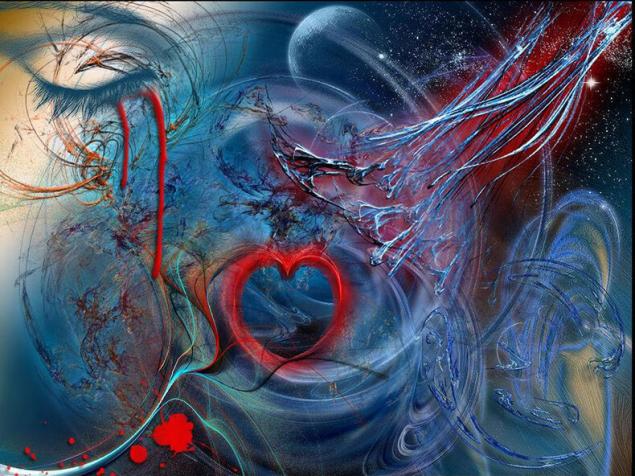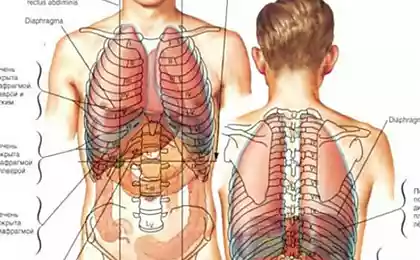1208
Emotional energy: scale of tones Ron Hubbard
Each of us during the day has a lot of feelings. But have you ever thought about what emotion is energy?
Strong emotions are accompanied by a variety of physiological changes such as palpitations, changes in blood pressure, respiratory rate, shaking of the hands or feet, redness or skin moisture. More moderate emotions are less likely to cause a strong physiological response but the body's still something going on. It is on the identification and recording of physiological responses is based the working principle of the polygraph – a lie detector.
The amplitude of the emotions (mood swings) different people may be very different. It depends on many factors – temperament, education, character, nationality, etc. So if the phlegmatic is dominated by a relaxed, steady mood, in contrast to the often hot-headed sudden change of emotions is commonplace.

Emotional behavior is affected by climatic conditions. We all know the emotional restraint of the representatives of the Northern peoples: restrained gestures and intonation, the mean facial expressions. After all, in cold climates, where there is little sunshine, people are forced to save psychic energy. Unlike the northerners the southerners the excess solar energy hot blood. Representatives of the southern nationalities are more impulsive, temperamental and generously spill out the emotions.
Emotion is energy, and this energy is in constant motion, which, sometimes unconsciously, is captured by others. Emotional energy affects our health and well-being, our relationships, our working capacity. People, who are aware of their emotions and able to manage them, is the master of his life.
In contrast, someone who does not know how to manage your emotional state, to live much more difficult. In some cases, this person is a little different from dog-catcher to the master in the effort to protect bone, which he himself the owner and left.
In the early 50-ies of the last century, American science fiction writer Ron Hubbard had proposed the so-called Scale tones, where a tone is called emotional position and emotional state.
In accordance with this scale the human condition varies regularly. Raising or lowering the tone depends on many various factors – from how things are going at work and in the family, received the news, successful or unsuccessful transactions of communication with certain people, etc.
The person responds by changing tone to change situations and circumstances. Sometimes a sharp change in tone can cause some trifle. In addition, each person has kind of become the norm for him, his usual "tone" – its inherent emotional state: for someone the norm is the constant discouragement and frustration, and for someone- aggression, and for someone- a cheerful, buoyant mood, someone more or less serious events cause fear and fear, but someone to any problem is with humor.
The tone scale, L. Ron Hubbard
40.0 Serenity of existence
30.0 Postulates
22,0 Game
20.0 Action
8.0 Enthusiasm
6,0 Aesthetics
4.0 Enthusiasm
3.5 Joy
3,3 a Strong interest
3.0 Conservatism
The 2.9 Mild interest
2.8 Satisfaction
2.6 Lack of interest
2.5 Boredom
2.4 Monotonicity
2.0 Antagonism
1.9 Hostility
1.8 Pain
1.5 Anger
1,4 Hatred
1.3 Perturbation
1.2 Lack of empathy
Of 1.15 Unexpressed resentment
The 1.1 Covert hostility
1.02 Anxiety
1,0 Fear
0.98 Despair
0,96 Horror
0.94 Daze
0.9 Sympathy
0,8 Coaxing
0.5 Grief
0,375 Redemption
0.3 Nezalezhnosti
0.2 self-abasement
0,1 Victim
0,07 Hopelessness
0.05 Apathy
0,03 Uselessness
0.01 Dying
0,0 the death of the body.published
The stub for your future
Time selectivity
Source: v-garmonii-s-soboi.ru/chuvstva-i-emocii-cheloveka/energiya-emotsiy
Strong emotions are accompanied by a variety of physiological changes such as palpitations, changes in blood pressure, respiratory rate, shaking of the hands or feet, redness or skin moisture. More moderate emotions are less likely to cause a strong physiological response but the body's still something going on. It is on the identification and recording of physiological responses is based the working principle of the polygraph – a lie detector.
The amplitude of the emotions (mood swings) different people may be very different. It depends on many factors – temperament, education, character, nationality, etc. So if the phlegmatic is dominated by a relaxed, steady mood, in contrast to the often hot-headed sudden change of emotions is commonplace.

Emotional behavior is affected by climatic conditions. We all know the emotional restraint of the representatives of the Northern peoples: restrained gestures and intonation, the mean facial expressions. After all, in cold climates, where there is little sunshine, people are forced to save psychic energy. Unlike the northerners the southerners the excess solar energy hot blood. Representatives of the southern nationalities are more impulsive, temperamental and generously spill out the emotions.
Emotion is energy, and this energy is in constant motion, which, sometimes unconsciously, is captured by others. Emotional energy affects our health and well-being, our relationships, our working capacity. People, who are aware of their emotions and able to manage them, is the master of his life.
In contrast, someone who does not know how to manage your emotional state, to live much more difficult. In some cases, this person is a little different from dog-catcher to the master in the effort to protect bone, which he himself the owner and left.
In the early 50-ies of the last century, American science fiction writer Ron Hubbard had proposed the so-called Scale tones, where a tone is called emotional position and emotional state.
In accordance with this scale the human condition varies regularly. Raising or lowering the tone depends on many various factors – from how things are going at work and in the family, received the news, successful or unsuccessful transactions of communication with certain people, etc.
The person responds by changing tone to change situations and circumstances. Sometimes a sharp change in tone can cause some trifle. In addition, each person has kind of become the norm for him, his usual "tone" – its inherent emotional state: for someone the norm is the constant discouragement and frustration, and for someone- aggression, and for someone- a cheerful, buoyant mood, someone more or less serious events cause fear and fear, but someone to any problem is with humor.
The tone scale, L. Ron Hubbard
40.0 Serenity of existence
30.0 Postulates
22,0 Game
20.0 Action
8.0 Enthusiasm
6,0 Aesthetics
4.0 Enthusiasm
3.5 Joy
3,3 a Strong interest
3.0 Conservatism
The 2.9 Mild interest
2.8 Satisfaction
2.6 Lack of interest
2.5 Boredom
2.4 Monotonicity
2.0 Antagonism
1.9 Hostility
1.8 Pain
1.5 Anger
1,4 Hatred
1.3 Perturbation
1.2 Lack of empathy
Of 1.15 Unexpressed resentment
The 1.1 Covert hostility
1.02 Anxiety
1,0 Fear
0.98 Despair
0,96 Horror
0.94 Daze
0.9 Sympathy
0,8 Coaxing
0.5 Grief
0,375 Redemption
0.3 Nezalezhnosti
0.2 self-abasement
0,1 Victim
0,07 Hopelessness
0.05 Apathy
0,03 Uselessness
0.01 Dying
0,0 the death of the body.published
The stub for your future
Time selectivity
Source: v-garmonii-s-soboi.ru/chuvstva-i-emocii-cheloveka/energiya-emotsiy























